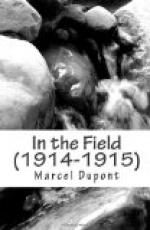“Eh bien, mon Capitaine! Anything new?”
“Oh! nothing, except my opinion that you will not be disturbed either to-day or to-morrow. Since yesterday evening they have not fired one shot, and they were singing hymns till midnight. You may be pretty sure they’ll redouble their Oremus this Christmas night, so you may sleep soundly.”
“Unless all this is merely a feint, and to-night ...”
“Yes, you’re right, unless to-night ...”
The column started, and, guided by the liaison orderly, we followed the high-road for some hundred yards. The shells had transformed it into a series of gorges, peaks, ravines, and hills. We had to jump over big branches cut from the trees by the projectiles. It was a road that would not be a cheerful one on moonless nights. Fortunately for us, that particular night was extremely bright. Everything around us could be distinguished; we could even divine about fifteen hundred yards to our right the “solitary tree,” the famous tree, standing alone in the middle of the vast bare plain, which marked the centre of our sector of trenches, and where I knew I should find the “dug-out” belonging to the officers of our regiment. I was very much tempted to jump the ditch at the side of the road and cut across the fields to the final point of our march. It would have taken about twenty minutes, and have saved us the long difficult journey through the communication trench. But our orders were very precise: we were not to take short cuts even on dark nights, much less on starlit nights. Our chiefs do well to be cautious on our behalf, for it is certain that, though fully alive to the danger of such a route, there was not one of my hundred fellows who would have hesitated to dash across country just to save himself a few hundred yards.
We came to the mouth of the approach trench, four or five huge steps cut in the chalky clay. The frost had made them slippery, and we had to keep close to the edge of the bank to avoid stumbling. Behind me I heard some of the men sliding down heavily, and a din of mess-tins rolling away amidst laughter and jokes. “A merry heart goes all the way,” and I knew my Chasseurs would soon pick themselves up and make up for lost time. This was essential, for the approach trench had ramifications and unexpected cross-passages which might have led a laggard astray.
We went forward slowly. The communication trench was at right angles to the enemy’s trenches. To prevent him from enfilading it with his shells, it had been cut in zigzags. And I hardly know of a more laborious method of progression than that of taking ten paces to the right, making a sharp turn, and then again taking ten paces to the left, and so on, in order to cover a distance which, as the crow flies, would not be more than fifteen hundred yards. The passage was so narrow that we touched the walls on either side. The moonlight could not reach the ground we trod on, and we stumbled incessantly over the holes and inequalities caused by the late rains and hardened by the frost. Now and again we slid over ice that had formed on the little pools through which our comrades had been paddling two days before. And this was some consolation for the severity of the frost, preferable a hundred times to the horrors of the rain.




